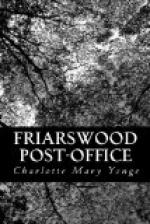Ellen heard plainly enough, and her heart sank. She tried to look at her brother’s face, but he had put it out of sight, and spoke not a word; and she only could sit wondering what was the real drift of the cruel words, and whether the doctor meant to give no hope of recovery, or only to dissuade her mother from vainly trying change of air. Her once bright brother always thus! It was a sad thought, and yet she would have been glad to know he would be no worse; and Ellen’s heart was praying with all her might that he might have his health and happiness restored to him, and that her mother might be spared this bitter sorrow.
Alfred said nothing about the doctor’s visit, but he could eat no dinner, and did not think this so much the fault of his sickly taste, as of his mother’s potato-pie; he could not think why she should be so cross as to make that thing, when she knew he hated it; and as to poor Harold, Alfred would hardly let him speak or stir, without ordering Ellen down to tell him not to make such a row.
Ellen was thankful when Harold was fairly hunted out of the house and garden, even though he betook himself to the meadow, where Paul Blackthorn was lying on the grass with his feet kicking in the air, and shewing the skin through his torn shoes. The two lads squatted down on the grass with their heads together. Who could tell what mischief that runaway might be putting into Harold’s head, and all because Alfred could not bear with him enough for him to be happy at home?
They were so much engrossed, that it needed a rough call from the farmer to send Paul back to his work when the dinner-hour was over; whereupon Harold came slowly to his digging again.
Hotter and hotter did it grow, and the grey dull clouds began to gain a yellow lurid light in the distance; there were low growlings of thunder far away, and Ellen left her work unfinished, and forgot how hot she was herself in toiling to fan Alfred, so as to keep him in some little degree cooler, while the more he strove with the heat, the more oppressed and miserable he grew.
Poor fellow! his wretchedness was not so much the heat, as the dim perception of Mr. Blunt’s hasty words; he had not heard them fully— he dared not inquire what they had been, and he could not endure to face them—yet the echo of ‘nothing will ever do him good,’ seemed to ring like a knell in his ears every time he turned his weary head. Nothing do him good! Nothing! Always these four walls, that little bed, this wasting weary lassitude, this gnawing, throbbing pain, no pony, no running, no shouting, no sense of vigour and health ever again, and perhaps—that terrible perhaps, which made Alfred’s very flesh quail, he would not think of; and to drive it away, he found some fresh toil to require of the sister who could not content him, toil as she would.
Slowly the afternoon hours rolled on, one after the other, and Alfred had just been in a pet with the clock for striking four when he wanted it to be five, when the sky grew darker, and one or two heavy drops of rain came plashing down on the thirsty earth.




